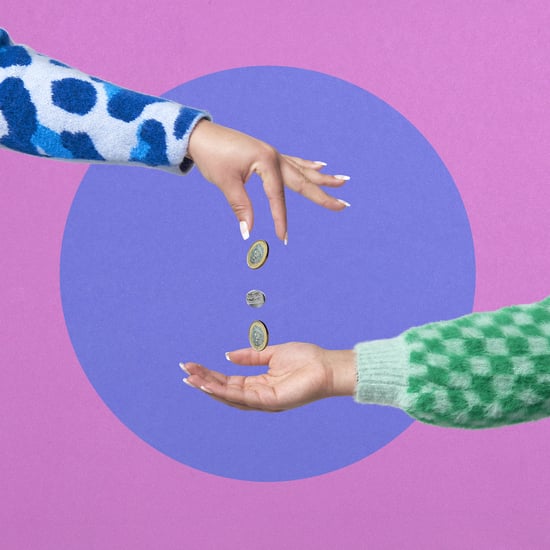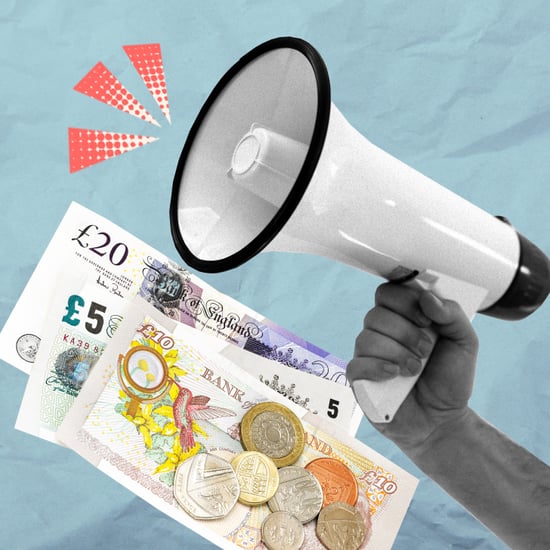What Is the No-Spend Challenge, TikTok's 2024 Finance Trend?
How to Succeed at TikTok's "No-Spend Challenge"

Image Source:Getty
In 2024, we are all becoming more aware of our financial choices and the amount we spend. In recent years, financial experts and bloggers have popularised the idea of temporary spending freezes as a way to achieve our financial goals. I'm sure you've heard of Loud Budgeting, the TikTok finance phenomenon from the start of this year that encouraged us all to curb impulse spending and be more honest about our financial situations. Now, a new financial challenge has gripped the social media app — the no-spend challenge.
Will Fenton, owner of financial hub Stirling Savvy tells POPSUGAR: "I find TikTok's viral no-spend challenge to be an innovative and positive approach to addressing personal finance habits. It can serve as a catalyst for transforming our mindset about frivolous spending, by prompting us to confront our habits and priorities." He adds: "It serves as a reminder that managing money doesn't have to be dull or intimidating; it can be fun and empowering to take control of our finances."
So what is the no-spend challenge? And how can you weave the challenge into your every day financial decisions? Read on to find out more about the challenge and get expert commentary on how to do it.
What Is the No-Spend Challenge?
The no-spend challenge is a personal finance strategy where individuals commit to avoiding spending money on non-essential items for a certain period, typically a month or longer. The end-goal is to save money, become more mindful of spending habits, and focus on needs rather than wants. Participants often track their progress and find creative ways to meet their needs without spending money.
25-year-old TikTok creator Chrissie Milan lives in London and has been documenting her no-spend journey heavily on the app. She is attempting to only spend on essentials for a whole year after an enlightening trip to Thailand changed her perspective on what she deems as essential spending. On her trip, Chrissie was shocked to see the drastic difference in the cost of existing in Thailand compared with the UK.
@chrissie.milan My #nospendchallenge is all about mindful spending 💘 It’s so easy to spend a little here and splurge there just ✨because✨ but when you realise how much it adds up - it can be haunting 😭 so here’s to a year of intentional spending (attempting it anyway)🥂 #nospendchallenge #nospendfebruary #budgetingtiktok #howmuchispendinaday #dailyvlog #dayinmylife #personalfinance #loudbudgeting #lifeinyour20s #minimalistlifestyle
♬ original sound - Chrissie
She says in one of her videos: "Hearing that it only takes £27 per day to spend an extra £10,000 per year was enough to make me want to throw up. I'm determined to make a lifestyle change - it's not meant to be an overnight switch, it's more like a restructuring - understanding what really matters to me and intentionally choosing where my money goes. It's about taking back control." Milan admits that whilst every day hasn't been easy or successful, she knows the challenge is really about striving for long-term change.
What Are the No-Spend Challenge Rules?
The rules of the no-spend challenge vary for each individual, but the fundamentals are the same. The length of time people do the challenge also differs. For some people it's starting with attempting the challenge for a week, whilst others are attempting it for a whole year. You can also decide what's deemed essential for you and what is not, but you have to stick to it. The end goal for everyone should be about changing your spending habits.
"I'm determined to make a lifestyle change - it's not meant to be an overnight switch, it's more like a restructuring - understanding what really matters to me and intentionally choosing where my money goes."
Milan says she used to be a frivolous spender, but now saves an average of £500 a month and is on track to save £6,000 by the end of the year. The video producer cut her £150 per month budget for clothes shopping and hit pause on her pricey evening meal meet-ups with friends. Milan also cut out daily coffees and stopped buying lunch outside and opted for home-cooked food, which saved her £240 a month.
@themontaqueclarkes I can’t believe the no spend January challenge is coming to an end. So rather than jumping straight into spending I thought it best to transfer over to a couple of low spend months before setting a strict monthly budget. #nospendmonth #nospendtips #financialfreedom #financialliteracy #financialreset #lowspendmonth #lowspendchallenge #savingschallenge2024 #familybudget
♬ original sound - The Montaque Clarkes
Whereas TikTok creators The Montaque Clarks are a family of four and have different rules. This month, apart from paying for their bills and topping up their children's saving accounts, they are cutting down on extra spending. Natasha and Rob have allowed a weekly food shop but it cannot exceed £70. Throughout their content they note batch-cooking as a great money saver. New clothes and shoes are only allowed for their two children, Hettie and Athena. As a family, they are allowed to eat out once a month and have one takeaway per month. Top-up food shops are still not allowed within the week and birthday presents are allowed but they will have a set budget in place.
How Do You Actually Succeed at the No-Spend Challenge?
To succeed at the no-spend challenge, consider these suggestions from TikTok creator CBC Street Cents and Money Saving Expert.
What Are the Pros and Cons of the No-Spend Challenge?
According to financial expert Fenton, the pros of the no-spend challenge include that it raises awareness about unnecessary spending habits. "The no-spend challenge encourages participants to reflect on their spending behaviours and identify areas where they can cut back or make more mindful choices." He also says that it encourages creativity in finding alternative activities. He tells POPSUGAR: "Participants often discover new hobbies, experiences, and ways to have fun that don't involve spending money, fostering creativity and resourcefulness." It can also help individuals save money and reach financial goals faster. "By temporarily halting non-essential spending, participants can redirect those funds towards savings, debt repayment, or other financial goals, accelerating their progress towards financial independence," he says.
However, there are some cons to the challenge. Fenton explains that it might be be difficult to sustain this new way of living for extended periods. "Some participants may find it challenging to adhere to the strict rules of the challenge over the long term, leading to feelings of frustration or failure," he says. It could also cause deprivation if not balanced with essential purchases. He tells POPSUGAR: "While limiting discretionary spending can be beneficial, excessively restrictive measures could lead to feelings of deprivation or missing out on important experiences or necessities."
And the final con is important - he says that the challenge might not address underlying issues contributing to overspending. Fenton explains: "The challenge focuses on behaviour modification rather than addressing the root causes of overspending, such as emotional triggers or lack of financial literacy, which may limit its effectiveness in the long term."
"By temporarily halting non-essential spending, participants can redirect those funds towards savings, debt repayment, or other financial goals, accelerating their progress towards financial independence."
Is the No-Spend Challenge Sustainable?
Milan has been very candid with her TikTok followers about the difficulties of the challenge. She admits that although she can see the difference in her spending, it doesn't feel natural to cut out all of the things that she enjoys doing. She said in one video: "We spend lots out of convenience and the first few weeks I found easy as it felt like a new challenge. In the middle it dipped a bit and it was easy to slip into old habits. Things like meal prep and planning ahead gets harder. I had a few weeks in the middle where I regressed slightly."
@chrissie.milan Not our #nospendchallenge making the news?!?! 🫣 #nospend #nospendmarch #budgetingtiktok #howmuchispendinaday #dailyvlog #dayinmylife #personalfinance #loudbudgeting #lifeinyour20s #minimalistlifestyle #savingmoney
♬ original sound - Chrissie
It might just be that it's good to practice the challenge for short periods of time, which can later lead to long-term change. As financial expert Fenton says: "The sustainability of the no-spend challenge varies from person-to-person and depends on several factors. While it can be an effective short-term strategy to reset spending habits and kickstart savings goals, maintaining a strict no-spend policy indefinitely might pose challenges for some individuals."
He continues: "Factors such as income level, financial obligations, and lifestyle preferences all play a role in determining its sustainability. Even if the challenge isn't sustainable in the long term for everyone, the lessons learned and habits formed during the challenge can have lasting benefits, contributing to improved financial literacy and decision-making skills."
Aaliyah Harry (she/her) is the associate editor at POPSUGAR UK. She writes extensively across lifestyle, culture and beauty. Aaliyah also has a deep passion for telling stories and giving voice to the voiceless. Previously, she has contributed to Refinery29, Grazia UK and The Voice Newspaper.





